I recently watched the film Coherence, written and directed by James Ward Byrkit and starring Emily Baldoni, Maury Sterling, Nicholas Brendon, Elizabeth Gracen, Alex Manugian, Lauren Maher, Hugo Armstrong, and Lorene Scafaria. If you’re not terribly familiar with those names, check the IMDB page, you’ll likely recognize some of their faces.
It’s an interesting sci-fi movie with a deceptively simple premise: On the night eight friends gather for a dinner party, a strange comet passes overhead. Technology malfunctions, glasses shatter, and the lights go out – and they discover that the whole neighborhood is dark and abandoned, except for one house that blazes with the lights on. When they investigate, they discover the other house is … their house, and inside is … them.
SPOILERS
Spoilers? YES WE HAVE THAT. Don’t read if you fear spoilers.
So, the film essentially deals with a “Many World” premise: The comet has somehow caused coherence between realities, meaning the separate realities of quantum physics can, for a short time, interfere and affect each other. What this means in practice is that whenever someone leaves the house and passes through a “dark area” between House Prime and the Other House, they are actually spun randomly into a parallel universe, sometimes replacing themselves, sometimes encountering themselves.
What’s great about the story is that none of this is immediately obvious, and it (mostly) avoids tedious exposition (there is a moment with a Magic Science Book of Immense Convenience, but they had to figure out some way of getting the physics stuff spelled out). In fact, one of the greatest pleasures of the film is looking back and trying to figure out when, exactly, the exchanges between realities begin – and realizing it might have been much earlier in the story than you originally thought.
Also amazing: The ending, which is genius, brutal, and cuts on a final shot that floors. Emily Baldoni ought to get an award for that final facial expression alone.
Anyways, I’m not here to praise Coherence unconditionally. Because it does rely on a common sci-fi trope that is very unfortunate: It’s characters are all simultaneously morons and geniuses.
MORONS
On the one hand, these folks react to stuff in insane ways. The lights go off, and everyone almost immediately goes crazy, jumping at every noise and generally acting like they’re in a disaster movie even though most people have experienced a blackout before. These people immediately begin running around like decapitated chickens. Then, they do remarkably crazy things, like marching off into the night to “investigate” things when the obviously better idea would be to stay inside with allies.
GENIUSES
On the other hand, they figure out what’s happening remarkably fast, and when one character explains the whole Many Worlds thing and throws in Schrödinger’s Cat for good measure, they all absorb and comprehend it immediately and begin working on the assumption that they’re in a sci-fi scenario without any resistance or difficulty.
STORY MECHANICS
I get it. As a writer, I get it, and, frankly, Coherence handles this pretty well. The characters are all presented as reasonably smart people through the initial interactions and conversations, and I much prefer this sort of Genius Character than a more typical Always in Denial character you see in other sci-fi stories – you know, the characters who continue to insist nothing strange is happening way past the point that any reasonable person would cling to their illusions. The AID character is infinitely more annoying.
And the thing is, you need your characters to be both Morons and Geniuses in a story like this. Because if they were smarter and decided to hang back in the house and be calm and safe, they never find out the bits of information that spell out what’s happening. And if they aren’t immediately able to comprehend what’s happening, they can’t explain it to the audience and also they can’t take the story in the interesting directions you want it to go. So, I get it: Sometimes your genius characters have to be morons, or vice versa.
And, frankly, Coherence handles it very well. It gives you information very subtly, relying on the smarts of its audience (though it’s not like Primer in complexity – it’s fairly easy to track what’s going on once you figure it out). The fact that the characters, by about the midway point of the film, have all swapped out to alternate realities without realizing it is a fantastic idea – because their interactions just start to be off, slightly. Imagine you came home and your wife or husband or best friend was suddenly just off – you can’t figure it out, but you remember things differently, or they just say or do something that’s all wrong. Without knowing what’s happened, it just inspires a paranoia – which is what this movie deals in brilliantly.
I’d go see it. If only for that final facial expression.

